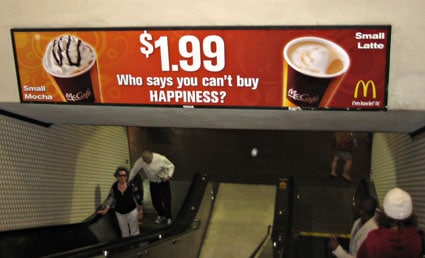Butlers in high demand, ready for any household job [SF Chronicle] – Are we in a service economy or is this just an upper-crust exception?
The path to becoming a truly top-notch butler is certainly not for the faint of heart – or ego. Hours can be long, and physical labor, depending on the number of staff members, can be exhausting. What is critical is utter dedication to the skill of superior – and tactful – service. An extraordinary butler can look forward to a long career with the same family and a base salary as high as $100,000 or more. The more talented and cosmopolitan, the more desirable. “Most people are surprised to learn that butlers don’t wear tails very often,” Grise says. “I’ve known them to sport khaki shorts and white crew shirts, especially when traveling in settings where they need to blend in discreetly and not draw attention away from their principals.”
Brits Find Writing a Cheddar Anthem That Isn’t Cheesy Isn’t Easy [WSJ] – Perhaps if they settled for jingle or doggerel rather than going for the anthemic, it might be more easily accomplished.
Despite the global spread of Cheddar, Britain has done little to promote the cheese as a cultural icon. There are no well-known poems to Cheddar and, until now, no songs. In the Somerset village of Cheddar, where the cheese was invented 900 years ago, all but one Cheddar-maker has melted away. Other countries treat their curds with more reverence. A French village has erected a statue of Marie Harel, the supposed inventor of Camembert. Last year, a Dutch astronaut persuaded the National Aeronautics and Space Administration to send up more than 20 pounds of Amsterdam cheese as he circled the planet in the international space station. The Cheddar song competition hopes to tap into a year of nationalistic pride, as Britain hosts the Olympics and celebrates the Queen’s jubilee. More than 100 entries poured in, from career musicians, church choirs, kids, grannies and a team of crooning puppets.
Don’t Indulge. Be Happy [NYT] – This sort of research continually reveals surprising and counter-intuitive aspects of what influences and is influenced by our emotions.
Imagine walking down the street to work and being approached by our student Lara Aknin, who hands you an envelope. You open the envelope and find $20 and a slip of paper, which tells you to spend the cash on something for yourself by the end of the day. Sounds like a pretty sweet deal. Now imagine instead that the slip of paper told you to spend the cash on someone else. Being generous is nice, sure, but would using the money to benefit someone else actually make you happier than buying yourself the belt, DVD or apps you’ve been dying to get? Yes, and it’s not even close. When we follow up with people who receive cash from us, those whom we told to spend on others report greater happiness than those told to spend on themselves. And in countries from Canada to India to South Africa, we find that people are happier when they spend money on others rather than on themselves. But what about individuals who are notorious for their struggles with sharing? Surely the emotional benefits of giving couldn’t possibly apply to very young children, who cling to their possessions as though their lives depended on it. To find out, we teamed up with the developmental psychologist Kiley Hamlin and gave toddlers the baby-equivalent of gold: goldfish crackers. Judging from their beaming faces, they were pretty happy about this windfall. But something made them even happier. They were happiest of all when giving some of their treats away to their new friend, a puppet named Monkey.
PLAY video memo pad – I saw this in a store in Barcelona and experienced a small science-fiction moment, when technology becomes cheap and disposable enough that it can be used in ad-hoc ways. It reminds me of when calculators shifted from being a $200 purchase to a freebie embedded on a keychain, etc.
If you only tend to bump into family or flatmates when you’re both queuing for the bathroom, it’s not easy remembering to pass on important information. After a while communications can break down, messages can be misplaced, misunderstandings can occur; and before you know it, you’re having fisticuffs on the landing over something as mundane as replacing the tin foil. Well not any more. Because the Play Video Memo Pad lets you record video messages up to three minutes long for your flatmates (or even your future self) to play back later. A magnetic plate on the back makes it ideal for sticking to the fridge or any metal surface, so it’s always to hand when you need it.
Fonts in Use – Once again, the power of the Internet to crowdsource significant databases of elements of the real world, tagged and categorized.
Fonts In Use is a public archive of typographic design indexed by typeface, format, and industry. We document and examine real-world typography with the goal of improving typographic literacy and appreciation. The new version, launched in July 2012, introduces the Collection, a much larger database open to contributions from visitors. Any kind of image is welcome in the Collection, as long as type is clearly visible.
